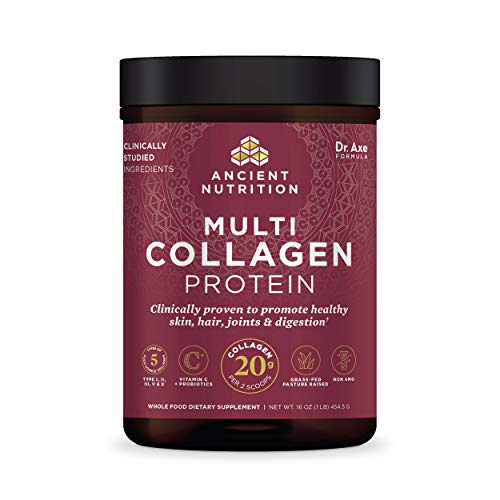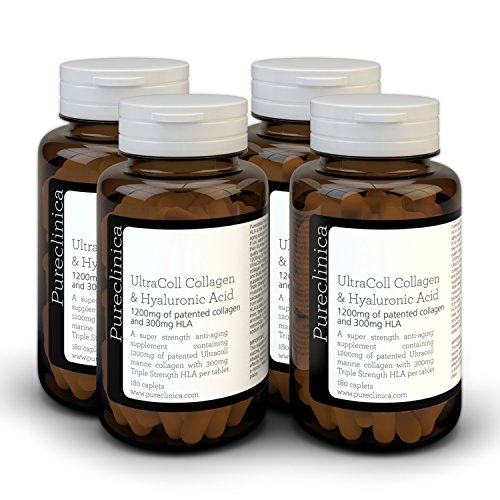These natural substances, including hyaluronic acid, are particularly known for combating the signs of aging on the skin. They also have other benefits for the body, such as improving joint comfort. Find out more about hyaluronic acid and collagen, and discover the potential of their combination.
What you will learn
What is hyaluronic acid?
The combination of hyaluronic acid and collagen can be beneficial for the body.
Hyaluronic acid, also called hyaluronate, is a carbohydrate macromolecule naturally present in connective, epithelial and nervous tissues. It is a high viscosity substance responsible for the hydration and elasticity of tissues. It should be noted that the synthesis of this acid gradually decreases with advancing age.
Hyaluronic acid is mainly known for its cosmetic properties. Nevertheless, it is attributed other beneficial effects, in dermatology, rheumatology, ophthalmology or even gynecology.
What is collagen?
Collagen is a major fibrous protein in mammals.
Thus, it represents 5% of the mass of these living beings. This is because collagen is produced naturally within connective tissue. It is found in particular in the composition of the skin, bones and cartilage, muscles, tendons and ligaments, walls of blood vessels… This protein confers resistance to tissues and ensures their cohesion.
Collagen is popular as part of its action against aging skin. However, it can also help maintain good bone, joint and muscle capital. Finally, it contributes to digestive health.
Why associate them?
These substances are both linked to beneficial effects affecting the articular and skin spheres. In this regard, the action of hyaluronic acid and that of collagen are complementary: they potentiate each other.
While it is true that both substances fight the signs of aging on the skin, they work in different ways. Hyaluronate is primarily responsible for hydrating the skin, and it should not be forgotten that it stimulates the production of elastin and collagen. As for the latter, it rather has the ability to fill in wrinkles, to redensify. Hyaluronic acid and collagen thus form a promising synergistic complex.
Hyaluronic acid and collagen also embody a good combination in the context of joint problems. Note that here again, the fact that the first substance induces the synthesis of the second is particularly interesting.
It should be noted that many food supplements available for sale contain a mixture of these two molecules.
The different shapes
Injectable form
Anti-aging effect
Hyaluronic acid and collagen are available as injections. They are performed by doctors with the aim of temporarily filling wrinkles.
It should be noted, however, that the administration of collagen in this form is increasingly rare, in favor of hyaluronate. Indeed, the latter would present less risk of allergic reactions and would have a wider therapeutic range than injectable collagen.
Joint pathologies
In some cases, intra-articular injections of hyaluronic acid may be given.
It should be noted that the solutions containing this active principle mainly have the status of medical devices, but some are considered as drugs. Since the end of 2017, all viscoelastic injectable solutions based on hyaluronate are no longer reimbursable.
Food supplements
They come in the form of powder, capsules, capsules or tablets, for a deep action.
Collagen
In food supplements, we mainly find type II collagen. It is extracted from the bones of chickens or from the skin and / or cartilage of fish (in the latter case, it is called marine collagen) and then it is hydrolyzed.
It is advisable to choose a product with a low molecular weight: it will be more assimilated by the body.
Hyaluronic acid
There are two methods of obtaining this substance. The first is to take roosters’ ridges, which will be processed and purified. The second is more widely practiced today. This is a fermentation process using bacteria, which results in the synthesis of hyaluronic acid.
Such as collagen, it is advisable to move towards a supplement of low molecular weight hyaluronate, in order to promote better absorption.
Cosmetic products
Many products, like creams, serums, gels … contain hyaluronic acid and / or collagen. These cosmetics can have beneficial effects on the upper layer of the epidermis only. This will allow you to feel better hydration or tighter skin after application.
Oral supplementation dosage
The intake of food supplements, based on hyaluronic acid or collagen alone, or in combination, is recommended for a minimum period of 3 months.
The following items are provided for information only, do not hesitate to consult a healthcare professional in order to obtain personalized recommendations.
Hyaluronic acid
When you read the scientific studies on hyaluronate, you can see that one intake of hyaluronate is generally equivalent to 100 mg.
To benefit from the anti-aging effect, an intake of 100 to 150 mg per day is sufficient, depending on the food supplement chosen.
If you want to relieve your joints, it is recommended that you take two 100 mg per day.
Collagen
Most often, the daily doses of collagen hydrolyzate administered in clinical trials are between 1 and 5 g.
Association
Many products are composed of a complex combining the two molecules. It should be noted that the dosage and the recommendations vary depending on the distributor.
Precautions for use
Contraindications
It is not recommended to take collagen, alone or in combination with hyaluronic acid, for people with a food allergy, especially to fish.
Also be careful if you are a vegetarian, and you do not want to deviate from your diet.
People with kidney disease should seek medical advice before supplementing with collagen.
In addition, hyaluronic acid and collagen are not recommended for children as well as pregnant or breastfeeding women.
Interaction with other substances
Taking anti-coagulant therapy is incompatible with intra-articular injections of hyaluronic acid, due to the risk of local bleeding.
Interaction with other substances
Taking anti-coagulant therapy is incompatible with intra-articular injections of hyaluronic acid, due to the risk of local bleeding.
Side effects
Oral supplementation
If you follow the dosage and the duration of the treatment, you are generally not exposed to side effects.
There have been very rare cases of gastrointestinal disturbances as a result of the absorption of collagen.
Skin application
As with any skin application, a test should be carried out first on a small area of the skin, in order to ensure that the cosmetic product is tolerated well.
Anti-aging injection
Side effects are rare and usually involve the injection itself. It may be redness or small bruises at the injection site. The aesthetic appearance may, in some cases, not be there: overdoses are, for example, the cause of unsightly edema.
Intra-articular injection of hyaluronic acid
Although very rare, an allergic reaction can occur. There is especially pain and / or inflammation in the affected area.
To date, research indicates that this therapy can be considered safe.
Other interesting combinations
Hyaluronic acid and collagen therefore form a promising combination. Other molecules can be added to this complex, in order to potentiate it. In particular, it can be:
vitamin C, to benefit from its antioxidant effect, but also to potentiate the supply of collagen,
chondroitin sulfate, which participates in the synthesis of cartilage and its hydration
and N-acetylglucosamine, or NAG, with beneficial properties on joints and skin structure.
Some laboratories also market synergistic formulas.
Read also
























